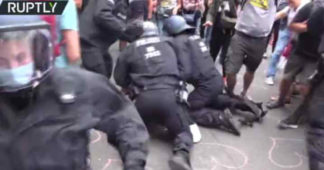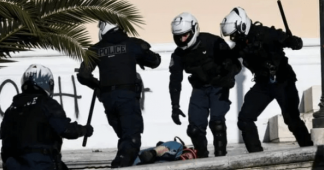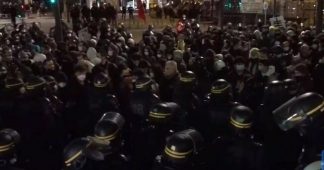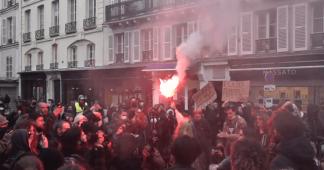By Marianne Arens
6 June 2023
Police encircled around 1,000 demonstrators in a police “kettle” in the Connewitz district of the city of Leipzig, Germany, on Saturday night for up to eleven hours. The demonstrators were protesting against the harsh sentence delivered on June 1 against the anti-fascist activist Lina E.
Even captive children were held for hours, initially without access to drinking water or toilets. Everyone in the kettle was forced to provide identification before they were finally released at 05:00 a.m. on Sunday morning. Several persons reported that they had been forced to hand over their mobile phones.
Fifty people were taken to a police detention centre, where 30 were still being held on Monday morning. They face charges of aggravated trespass and assaulting police officers.
Nachtrag zu #TagX in #Leipzig: Als die Polizei die Straße räumen wollte, zückte ein Beamter seinen Schlagstock und schlug damit für mich anlasslos auf Kopfhöhe wild um sich. Aus meiner Sicht unverantwortlich, weil schlimmste Verletzungen damit einhergehen können. #le0306 #le0406 pic.twitter.com/0VH29K14s7
— Tim Lüddemann (@timluedde) June 4, 2023
Meanwhile, reports on the internet reveal the brutal violence used by police. Tim Lüddemann, a taz reporter, explained in a video: “When the police wanted to clear the street, an officer pulled out his baton and beat me wildly at head height without any reason. In my point of view this was completely irresponsible, because it could have resulted in the worst type of injuries.”
Another video was posted online by Lüddemann and his colleague Konrad Litschko directly from the police encirclement. Litschko said: “The fundamental right to freedom of assembly was very, very limited here.”
On Sunday, Leipzig mayor Burkhard Jung (Social democrats, SPD) thanked the police and called the detained youths “crazy delinquents in Connewitz.”
In fact the Leipzig police kettle was anything but a spontaneous police reaction to violent rioters. Rather, it was a planned provocation aimed at intimidating left-wing protest. At the same time, it served to stir up public opinion in order to enforce stricter laws and dismantle basic democratic rights.
Already on Sunday, the Saxony Interior Minister Armin Schuster (Christian Democrats, CDU) called for a “concept against left-wing extremism” at a federal level. Germany’s Interior Minister Nancy Faeser (SPD) also announced on Sunday that the state would “continue to keep a very close eye on the violent left-wing extremist scene in the coming days and weeks” and would “intervene consistently when criminal and violent acts occur.”
However, the police encirclement in Leipzig shows the extent to which violence originates from the state, which deliberately provokes violence and then ruthlessly exploits it for propaganda purposes.
The demonstration on Saturday evening in Leipzig-Connewitz was in reaction to the Dresden verdict against Lina E. The 28-year-old woman had been sentenced to five years and three months, her three co-defendants to around three years in prison each, for allegedly forming a criminal organisation and attacking and injuring neo-Nazis.
The protest against this harsh sentence was also directed against a state that has a long record of promoting and covering up the crimes of the far right. The most recent examples include the involvement of large numbers of secret service under cover agents in the neo-Nazi NSU gang which murdered nine migrant workers and one police woman and the notorious Hannibal network of prepper groups in the German army (Bundeswehr). The tentacles of right-wing extremism reach into the highest levels of state and politics.
Shortly after last Wednesday’s verdict all demonstrations related to the Lina E. case had been banned In Leipzig, following claims that a “non-peaceful course of events” could be expected. A 48-hour police “control area” was imposed over part of the city and only one rally was allowed on Saturday evening.
Jürgen Kasek, a Leipzig lawyer and Green city councillor, had announced the rally under the motto: “Freedom of assembly also applies in Leipzig.” Several thousand participants came to the demonstration at Alexis-Schumann-Platz, among them a great many young people carrying placards with inscriptions such as “Free Lina” or “Solidarity against Nazis!” Also in attendance were families with baby strollers, senior citizens, so-called “Grannies against the right” and a group in solidarity with imprisoned Turkish opposition members.
From the start, the rally was met with an unprecedented police presence: many hundreds of martially equipped police, including officers from several federal states, appeared, along with heavy equipment, an armoured vehicle and water cannons. A police helicopter circled overhead.
The police made clear they would not allow any demonstration, thereby provoking protesters. Some participants shouted at the police “Where were you in Hanau?”—a reference to the shooting of nine people by a far right extremist under the noses of the police. A deputy of the Left Party in the Saxony parliament, Juliane Nagel, also protested loudly and some in the crowd from the anarchist black block threw bottles and stones at the police.
This then served as a pretext for the police to encircle a large part of the demonstration—about 1,000 people in total—in the directly adjacent Heinrich-Schütz-Platz and detain them all night. Frustrated, Green city councillor Kasek stated: “I have the impression that it was never planned that we would be allowed to walk,” the whole thing seemed “like a trap.”
The SPD politician Albrecht Pallas, a former police officer, also criticised the “massiveness of the police presence.” This had had “an escalating effect,” which had mainly affected bystanders.
The taz newspaper commented that an “absurdly expensive large-scale deployment” and a “police circus beyond all proportionality” had been staged for a “few hundred antifas, some of them minors.”
What happened in Leipzig on Saturday night, however, was not an exaggerated isolated incident that got out of hand, but rather an operation planned long in advance. The media had literally been predicting violent protests days before the verdict of Lina E. was announced. When they failed to materialise—the police provoked a counter-reaction with their massive operation.
This was confirmed by the remarks made by the state Interior Minister Schuster on MDR television. Schuster said that “joint decisions” had been made in the run-up to the police encirclement and that there had been “perfect cooperation this weekend: with the city of Leipzig, the police, the public prosecutors and judges, who were also on the scene.”
The police encirclement in Leipzig-Connewitz is part of an escalation of police violence and state armament aimed at suppressing any kind of social and political resistance. A few days before the police crackdown, police carried out nationwide raids on May 24 against leading members of the “Last Generation,” whose website was blocked and whose accounts were frozen, even though they are non-violent environmental activists. This was then followed by the drastic verdict in the Lina E. case and on Saturday the massive police crackdown.
The state is quick to brand any form of civil disobedience, strikes and even peaceful protests as “left-wing extremism” in order to nip them in the bud. The increasingly brutal police excesses are not directed against a few rioters, but against the working population as a whole. They are the response of the ruling class to a new upsurge in class struggle in a situation where the governing coalition in Berlin is desperate to wage and win its war against Russia.
The increasing use of state violence against youth, peaceful protesters and workers shows that it is impossible to wage war abroad without waging class war at home.
We remind our readers that publication of articles on our site does not mean that we agree with what is written. Our policy is to publish anything which we consider of interest, so as to assist our readers in forming their opinions. Sometimes we even publish articles with which we totally disagree, since we believe it is important for our readers to be informed on as wide a spectrum of views as possible.











